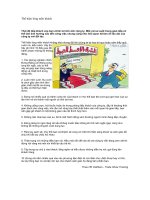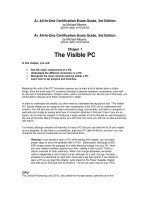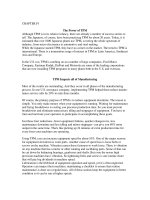Tài liệu The ROI Report pdf
Bạn đang xem bản rút gọn của tài liệu. Xem và tải ngay bản đầy đủ của tài liệu tại đây (346.62 KB, 24 trang )
Volume Six, Number 3 June 2002
the
ROI
Report
the
ROI
Report
Featured Organization:
Brother International
Corporation
Case Studies Analyzing
the Return On Investment of
Customer Relationship
Management (CRM) Initiatives
Brother Pursues Fully Integrated
CRM Strategy to Develop Customer
Loyalty, Projected 129% ROI.
Benefits
Reduce Returns.
Each 0.25% reduction in returns
Saves More than $1.6 Million Per Year
Consider Customer’s Lifetime Value (LTV)
not just transaction value.
Anticipate Customer Needs
for new product or software upgrades.
Maximize Customer Experience:
increase accessory sales & revenue growth.
Reduce Servicing Time
for end users, 40%; & dealers, 50%.
Consistently Improve Quality of Service.
Share knowledge across the organization through
the Solution Database.
Campaign to
Tightly Focused Target Groups
within hours.
The ROI Report is published by Hill|Holliday,
200 Clarendon Street, Boston, MA 02116. Copyright
2002, The ROI Report. Reproduction prohibited.
For more information, please call 1-800-283-1SAP.
Please refer to material No. 50 056 102.
Introduction and
Company Profile . . . . . . .
4
Business Context, Mission
and Driver, Strategy,
Business Case . . . . . . . .
6
Business
Transformation . . . . . . . .
8
Proceeding with
SAP CRM . . . . . . . . . . .
11
CRM: Strategy, Defining
Key Performance
Indicators . . . . . . . . . .
13
Implementation . . . . .
15
Implementation
Costs . . . . . . . . . . . . . .
16
Benefits . . . . . . . . . . . .
17
ROI . . . . . . . . . . . . . . . .
19
The Future . . . . . . . . . .
19
Lessons Learned . . . . .
21
About the ROI Report . .
22
Tài liệu tham khảo - www.marketingchienluoc.com
20 G lo ver Avenue Norwalk, CT 06850 V 203.642.5121 F203.642.5126 www.1t o1.c om
At Peppers and Rogers Group, we believe that the goal of Customer
Relationship Management (CRM) initiatives is the development of Learning
Relationships with customers. CRM practitioners leverage deep understanding of
individual customers to make their products or services increasingly smarter over
time relative to each customer’s needs. Customers are hesitant to reinvent this
relationship with another firm.
Building these types of relationships require a company to make difficult
changes in their firms. So why invest in CRM at all?
Dr. Martha Rogers and I have always considered CRM to be, first and fore-
most, a solid financial concept. CRM builds on the axiom that it is more cost-effective
to keep and grow an existing customer than to acquire a new one.
We were honored to be asked by SAP and Hill Holliday to review the design
and execution of this ROI Report. Our firm is often asked to conduct similar studies for
clients. And we are pleased to report that the processes used to uncover the financial
benefits and derive the financial formula for Brother’s CRM initiative were fully-consis-
tent with our own rigorous approach to measuring ROI.
In fact, we think the final ROI calculation is probably conservative. This is due
to the fact that most companies don’t yet measure baseline customer lifetime value
(LTV)—the sum total of expected future profit flows from a customer. Effective CRM
increases LTV. But without a baseline measure of LTV, we can’t compare the changes
from CRM to the baseline. So, we use existing metrics to measure the short-term
impact of CRM. Despite this conservatism, Brother still reports ROI in excess of 100%.
After learning about the Brother initiative, we are not surprised by this result.
Brother addresses customer needs that extend beyond the product itself, assisting cus-
tomers on issues of interoperability with other devices. In combination with the compa-
ny’s intelligent approach to collecting and storing the right customer data, Brother is
positioning itself to be able to deliver "smarter" service than its competitors over time.
Now that Brother has increased the percentage of the Kings that they can
identify, they might gain further benefit from ranking customers according to their
growth potential. This would help Brother allocate more resources to invest in such
accounts, perhaps providing even more proactive and regular support—ensuring that
these customers continue to choose Brother as they grow.
Brother is making huge steps towards becoming a trusted advisor to their cus-
tomers. Many customers are willing to pay a premium for products and services where
they can count on a company to "pick up the conversation where it last left off." As
Brother continues to turn customer data into powerful business strategies, they assure
themselves of continued CRM success!
Sincerely
Don Peppers
Founding Partner, Peppers and Rogers Group
Tài liệu tham khảo - www.marketingchienluoc.com
Brother is a growing global brand, recognized worldwide for providing high quality
value added products in the office and home. With the growth of the Small office and
Home Office (SOHO) market as well as corporate cost cuttings, Brother has established
itself as the value supplier. Brother International Corporation of USA (BIC, hereinafter
referred to as Brother) generated approximately $1 billion in revenues for 2001, more
than 70% coming from its Business Machine Group which sells office equipment such
as printers, fax machines, Multi-function Devices (MFDs), and Ptouch Electronic
Labeling Systems. Other businesses of Brother are personal and home products, and
industrial machinery and solutions. The Business Machine Group operates in a hyper-
competitive market with fragile margins. It is extremely sensitive to customer loyalty,
and is therefore a major focus for CRM. Brother sells its information and document
products predominantly thought retailers, resellers, and distributors, but takes sole
responsibility for all after sale customer contacts. The National Service Division of
Brother is organized to provide service to its Customers, and resellers as well as manage
Brother’s Parts Distribution, Return Center, and Customer Contact Centers.
Information and document products nowadays have to offer a dazzling array of features,
as well as interoperate with complementary products such as personal computers. Users who
become frustrated with products that don’t operate with their personal computers right out
of the box will either call for help and/or return the product. The vulnerability is manifested
by a high percentage of product returns in excess of 12% throughout the information and
document products industry.
EXECUTIVE SUMMARY
Brother Pursues Fully Integrated
CRM Strategy to Develop Customer
Loyalty, Projected 129% ROI.
Volume Six, Number 3 June 2002
the
ROI
Report
the
ROI
Report
Featured Organization:
Brother International
Corporation
Case Studies Analyzing
the Return On Investment of
Customer Relationship
Management (CRM) Initiatives
The ROI Report is published by Hill|Holliday,
200 Clarendon Street, Boston, MA 02116. Copyright
2002, The ROI Report. Reproduction prohibited.
For more information, please call 1-800-283-1SAP.
Please refer to material No. 50 056 102.
Introduction and
Company Profile . . . . . . .
4
Business Context, Mission
and Driver, Strategy,
Business Case . . . . . . . .
6
Business
Transformation . . . . . . . .
8
Proceeding with
SAP CRM . . . . . . . . . . .
11
CRM: Strategy, Defining
Key Performance
Indicators . . . . . . . . . .
13
Implementation . . . . .
15
Implementation
Costs . . . . . . . . . . . . . .
16
Benefits . . . . . . . . . . . .
17
ROI . . . . . . . . . . . . . . . .
19
The Future . . . . . . . . . .
19
Lessons Learned . . . . .
21
About the ROI Report . .
22
Tài liệu tham khảo - www.marketingchienluoc.com
Introduction and
Company Profile
Brother is a continually growing global
brand, recognized worldwide for providing
high quality value added products in the
office and home.
Brother International Corporation of
USA (BIC, hereinafter referred to as Brother)
the subject of this study, was established in
1954 and is the fully owned US subsidiary
of Brother Industries, Ltd. of Nagoya, Japan.
Brother in turn has several subsidiaries
including those in Canada, Mexico, Brazil,
Chile and Argentina. Brother recorded $1 bil-
lion in revenues, constituting 37% of Brother
Industries’ total revenues of $2.7 billion for
2001. Brother Industries, Ltd. as a group
consists of close to 60 subsidiaries world-
wide. Hence Brother’s top-level vision is
summed by the “Four Gs” of Group, Global,
Growth, and Green.
Brother Industries started in 1928 by
manufacturing sewing machines and is a world
leader in sewing machines for home and indus-
try, however sewing machines constitute a rel-
atively small portion of the business nowadays.
Brother Industries is now concentrated in four
major areas consisting of the information and
document business, the personal and home
business, the machinery and solution busi-
ness, and the retail and real estate business.
4
Reproduction Prohibited. Copyright 2002, The ROI Report.
Brother International
Corporation
the
ROI
Report
the
ROI
Report
Ⅲ Reduce returns. Each 0.25% reduction in returns saves
more than $1.6 million per year.
Ⅲ Enable viewing the lifetime value rather than just one time
transaction value of a customer.
Ⅲ Identify customers when they come close to needing a new
product or need software upgrades.
Ⅲ Maximize customer experience during each call, increasing
accessory sales, revenue growth.
Ⅲ Reduce time for servicing end users by 40%, $1.8 per
customer call.
Ⅲ Reduce times for servicing dealers by 50%, $3.5 per work
order, and up to $10 per swap.
Ⅲ Achieve consistent improved quality of service by spreading
the knowledge that was in the customer service reps’ mind
through the Solution Database.
Ⅲ Lower database maintenance costs by business users as well
as by MIS.
Ⅲ Campaign to tightly focused target groups within hours.
Ⅲ Eliminate multiple systems; use one common software
solution to support the growth of the business and its
processes. Identify and disseminate best practices.
Brother had chosen SAP in 1994 as its ERP system to replace all other mis-
sion critical legacy systems. In 2000 Brother proceeded with mySAP.com as its
CRM solution to continue with a fully integrated strategy. The new measure of
business success going forward would be the “Return on Relationship” requiring
the ability to turn customer data into business strategies and thereby customer rela-
tionships into equity. The National Service Division’s service center solution would
be the gateway for realizing the strategy. Further reduction in returns and increased
sales would be the end games. The ROI Report has projected the internal rate of return
on the investment of $1.7 million by Brother International Corp. into CRM to gen-
erate an estimated ROI of 129%.
EXECUTIVE SUMMARY
continued
Tài liệu tham khảo - www.marketingchienluoc.com
Over 70% of all revenue is generated
from the Business Machine Group which
produces office equipment such as print-
ers, fax machines, Multi-Function Devices,
and Ptouch Electronic Labeling Systems,
based on Brother’s deep competency in
printing technologies. The Business
Machine Group operates in a hyper-com-
petitive market with relatively fragile mar-
gins, and is extremely dependent on
technological innovation in electronics for
remaining competitive. Steady sale of sup-
plies provides some stability for ongoing
profits. Hyper-competition also means that
the information and document business
is extremely sensitive to fickle customer
loyalty, and is therefore a major focus for
CRM and this study.
Personal and home products include
embroidery and sewing machines. Personal
and home products share some similarities
with the information and document business
in terms of customer relationships and service.
These products too have become more sophis-
ticated and interdependent with advances in
information technology.
The machinery and solutions business
may perhaps be considered as being the
direct descendent of Brother’s original sewing
machine business. This business consists of
highly sophisticated indus-
trial sewing machines and
machine tools serving indus-
trial customers in the appar-
el, automotive and IT
industries among others. In
line with the general trend in
manufacturing industries
this business has redefined
itself as a solutions business
focusing on the customers’
production line and productivity. More recent-
ly with reduced product cycle times of the cus-
tomers, the machine tools have evolved from
being specialized to being general purpose and
configurable in order to support flexible pro-
duction cells and lines.
Brother sells its product line through
various dealers, resellers, retailers, office
superstores, and distributors.
Reproduction Prohibited. Copyright 2002, The ROI Report.
5
Brother International
Corporation
the
ROI
Report
the
ROI
Report
BROTHER INTERNATIONAL CORP. USA AT A GLANCE
Fig. 1
Sales:
$1 billion in 2001.
Employees:
1,200 in Americas, of which approximately
200+ in National Service Organization.
Headquarters:
Bridgewater, New Jersey.
Operations:
American subsidiaries in Canada, Mexico,
Brazil, Chile and Argentina. US R&D center in
Tennessee. US Distribution Centers in
California and Tennessee, US Customer
Contact Centers in California and Tennessee.
Businesses and products:
Information and document business producing
office equipment including printers, fax
machines, Multi-Function Devices (MFDs), and
Ptouch Electronic Labeling Systems.
Manufacture and sale of supplies for same;
Personal and home products business producing
sewing and embroidery machines; Machinery
and solutions business producing industrial
sewing machines and machine tool solutions
serving chiefly apparel, automotive and IT
industries.
Key Executives in CRM Initiative:
Terry Koike, President
Dean Shulman, Sr. Vice President
Charles H. Stadler, Vice President
National Service
Joy Applebaum, Director, National Service
CRM Project Leader
Dennis Upton, Chief Information Officer
Tony Serignese, Director, MIS
CRM Project Leader
Terry Koike, President, Brother International Corporation
“
It’s critical to have an end game
for implementing CRM.
One has to think ahead and ask
‘How will we know
we did better with CRM?’
”
Tài liệu tham khảo - www.marketingchienluoc.com
6
Reproduction Prohibited. Copyright 2002, The ROI Report.
Brother International
Corporation
the
ROI
Report
the
ROI
Report
Business Context,
Mission and Driver,
Strategy, Business
Case
The National Service Division of Brother
USA was formed in 1980 and has more than
200 employees most of whom are customer
service agents working at customer contact
centers. The charter of the division can be
summarized as Customer Satisfaction.
Deceptively simple as it may sound, defin-
ing customer satisfaction and defining the
customer relationship took many years, and
is a never-ending quest for Brother. The
National Service Division is organized into
four groups. These groups are King
(Customer Service,) Queen (Technical
Support,) Parts Distribution, and Returns.
The King is the ultimate end user and is
extremely demanding and must be serviced
at all times. The Queen is the dealer/reseller
who sells the ultimate end user Brother
products and also needs to be supported.
Having a Queen sell the end user meant
that Brother had to consistently produce
value-oriented product with high functionality.
Brother was committed to serving the right
features to the right customers by providing the
richest set of features when compared against
competitors at every critical price point. Brother
was always well known for being the best value
provider in the information and document
sector, especially appealing to small office and
home office (SOHO) users, because these
users tended to be more value conscious than
corporate purchasing bureaucracies.
The SOHO market was a niche until
the recession and corporate downsizing in
1991 created a boom of formerly employed
workers who now became self-employed.
Having a home office or being a consultant
was no longer a stigma. Brother was per-
fectly positioned for this market segment
and further established itself as the value
supplier. Dean Shulman, Sr. Vice President
explains, “During difficult times even the
CUSTOMER CALLS
Fig. 2
0
500
1000
1500
2000
1996 1997 1998 1999 2000
800
1400
1545
1770
1844
Telephone Calls Answered
0.1
0.3
0.5
.28 .43 .48 .48 .48
Calls Per Units Sold
Calls per unit sold are stable.
Source: Brother International
“
Brother recognized that it
was time to focus on
retaining and developing its
customer base.
”
Tài liệu tham khảo - www.marketingchienluoc.com
Reproduction Prohibited. Copyright 2002, The ROI Report.
7
Brother International
Corporation
the
ROI
Report
the
ROI
Report
richest King’s look to save money and
enhance their bottom line, but most refuse
to sacrifice quality. Brother products thrive
in this type of market.” This scenario was
repeated after the Internet bubble burst in
2000, further strengthened by the trend for
businesses to increasingly make use of flex-
ible telecommuting type work practices.
Brother, once again with its value philosophy
was best positioned to penetrate medium to
large businesses and corporations.
As the economy recovered after 1991,
Brother recognized it was time to hold on
to and to develop all these customers. It
would be necessary to somehow view the
lifetime value rather than just one time
transaction value of a customer. Everybody
knew that it was far less costly to keep an
existing customer and sell them something
else, but it wasn’t clear who these cus-
tomers actually were, or how they would
continue to be “Brother customers.” The
first step would have to be collect all the
important information about the customers
in one place.
At the time it was very difficult and
expensive to do the required type of data
collection and database management. Brother
struggled for several years with the tradi-
tional “warranty cards in the box” approach,
which yielded only marginal results. It was
apparent that the customer information was
in the hands of the Queen, the dealers, so
Brother opted for a strategy strongly sup-
porting the Queen. Brother assumed most
of the burden from the retailers by taking
responsibility for after sales related activi-
ties and calls. This worked well enough but
still did not close the loop and answer the
burning question for Brother, who was the
King and what did the King think?
In addition to the long-standing strate-
gic marketing requirements above, additional
factors conspired to make CRM a burning
need for Brother in the new millennium.
Information technology had become ubiq-
uitous among non-technical users such as in
the SOHO market. Information and docu-
ment products increasingly had to interoperate
with a great variety of personal computers,
TOTAL CUSTOMER SATISFACTION
Fig. 3
Who is
the Customer?
What has
Customer
Purchased?
When has
Customer
Purchased?
How is it
Used?
Has Customer
Called?
What were
the Issues?
Has Customer
had Service?
Customer satisfaction is a continuous feedback process.
Source: Brother International
“
During difficult times,
customers work to enhance their
bottom line without sacrificing
quality. Brother thrives in this
environment.
”
Tài liệu tham khảo - www.marketingchienluoc.com
operating systems, and application programs.
Brother’s products had become highly inter-
dependent with, and indeed vulnerable to
weaknesses in complementary products such
as personal computers and applications.
Users were becoming frustrated with
products that wouldn’t operate with their
personal computers without significant con-
figuring and troubleshooting effort on their
part, even when Brother was not really at
fault. In addition to heavy usage of auto-
matic fax-back and e-mail systems, calls
were avalanching into Brother’s five cus-
tomer contact centers. Brother was spend-
ing millions annually on customer service
and was not able to keep up with all the
calls. The vulnerability was manifesting
itself very painfully, in a high percentage
of product returns, typically in excess of
12% throughout the information and doc-
ument products industry.
Business
Transformation
The immediately identified need was to
do something to reduce the product returns.
Brother had determined as far back as 1996,
that simply answering more calls from the
approximately 1.8 million distinct callers
would address a significant portion of the
product returns. Of the calls, only 46% were
being answered, and those in turn were not
being serviced using anything other than a
rudimentary database. The database appli-
8
Reproduction Prohibited. Copyright 2002, The ROI Report.
Brother International
Corporation
the
ROI
Report
the
ROI
Report
BROTHER KEY PERFORMANCE INDICATORS
Fig. 4
Source: Brother International
Critical Success Factor:
Error-free Order Processing
Critical Success Factor:
Speed of Order Processing
Strategic Objective:
Total Customer Satisfaction
General Performance
Indicator:
On time deliveries
Measurable
Performance Indicator:
Orders with
Deliveries On Time (%)
Measurable
Performance Indicator:
Orders with
Correct Volumes (%)
General Performance
Indicator:
Volume accuracy
General Performance
Indicator:
Sales order cycle time
Measurable
Performance Indicator:
Cycle Time Goods Issue
Measurable
Performance Indicator:
Cycle Time Invoicing
General Performance
Indicator:
Return Rate
Measurable
Performance Indicator:
Returns Among
Sales Order Lines (%)
Tài liệu tham khảo - www.marketingchienluoc.com
cation was unable to keep up with the grow-
ing customer base, unable to refer to the ser-
vice history of a caller, unable to place
customer orders, and unable to provide essen-
tial information about inventory availability
or the status of an order.
The number of telephone calls answered
was increased by 131% from 1996 to 2000,
resulting in a steady decline that more than
halved the total dollar value of returned
items. In addition some information and a
FAQ system was made available on the
Internet. The apparent calls per unit sold
went up from 0.28 in 1996 and stabilized at
0.48 from 1998 onward even though call
volume grew continuously throughout this
time period. In other words, almost half of all
units sold intrinsically result in a customer ser-
vice call from the customer. (Fig.2)
It was recognized that while reducing
returns by answering more calls was crucial,
and progress was being made, it was not nec-
essarily the same as providing customer sat-
isfaction. Brother started from the premise that
a customer relationship supported by specif-
ically associated core processes would be the
foundation for customer satisfaction.
CRM was defined as having one face to
the customer regardless of the contact medi-
um, and providing a complete customer his-
tory at the push of a button to everyone facing
the customer. Total Customer Satisfaction
was then formulated as a continuous infor-
mation process as depicted in fig. 3, starting
with information on who purchased what
and when, continuing with how the prod-
uct was being used, and whether the cus-
tomer had contacted Brother and if so, what
the issues or service requests were. Only after
coming full-circle as many times as necessary,
would there be complete knowledge of the
customer and total customer satisfaction,
with any hope of keeping and growing a cus-
tomer with Brother forever.
Supporting the total customer satisfac-
tion information loop would require a
Business Warehouse. This could be partial-
ly populated by converting some of the exist-
ing data, however the final content
requirements would not be known until at
least some of the CRM processes were in
place and generating data. Capturing irrele-
vant information would be worthless.
Five process areas were identified as
critical for generating data as well as pro-
viding service. These were, answering of a call
through CRM, logging the call and retriev-
ing the customer information, accessing and
populating the solution database on an ongo-
ing basis for consistent answers, e-mailing or
faxing solutions, and finally maximizing cus-
tomer experience to be able to sell acces-
Reproduction Prohibited. Copyright 2002, The ROI Report.
9
Brother International
Corporation
the
ROI
Report
the
ROI
Report
BROTHER ENJOYS NEAR-ZERO EMPLOYEE TURNOVER IN SERVICE CENTERS
Brother’s National Service Division has achieved what may be an unprecedented feat in the service center
industry and has been doing so for many years since 1989. In the call center industry high employee turnover
rates are the norm. At Brother’s in-house customer contact centers the employee turnover rate is virtually nil
even while growth has been moderate. Employees attribute this to Brother being a good company to work for
with genuine concern for employees as evidenced by their benefits and working environment and continuous
training. Furthermore the customer service job remains interesting with a wide variety of products being sup-
ported allowing the development of expertise and associated pride by the employees over time. Joy Applebaum,
Director at National Service and the CRM Project Leader explains, that during the CRM project “we realized
that it was important to let them know what was happening. We did presentations and let our employees know
that the management was not just ‘trying to do something to them’ but there were business drivers and achiev-
ing total customer satisfaction was our common purpose. CRM functionality was presented to each group which
increased their feedback, their buy-in, and got their ideas integrated.”
Joy Applebaum, Director,
National Service CRM Project
Leader
“
Brother understood that a
customer relationship supported
by specific core processes
would be the foundation for
customer satisfaction.
”
Tài liệu tham khảo - www.marketingchienluoc.com









